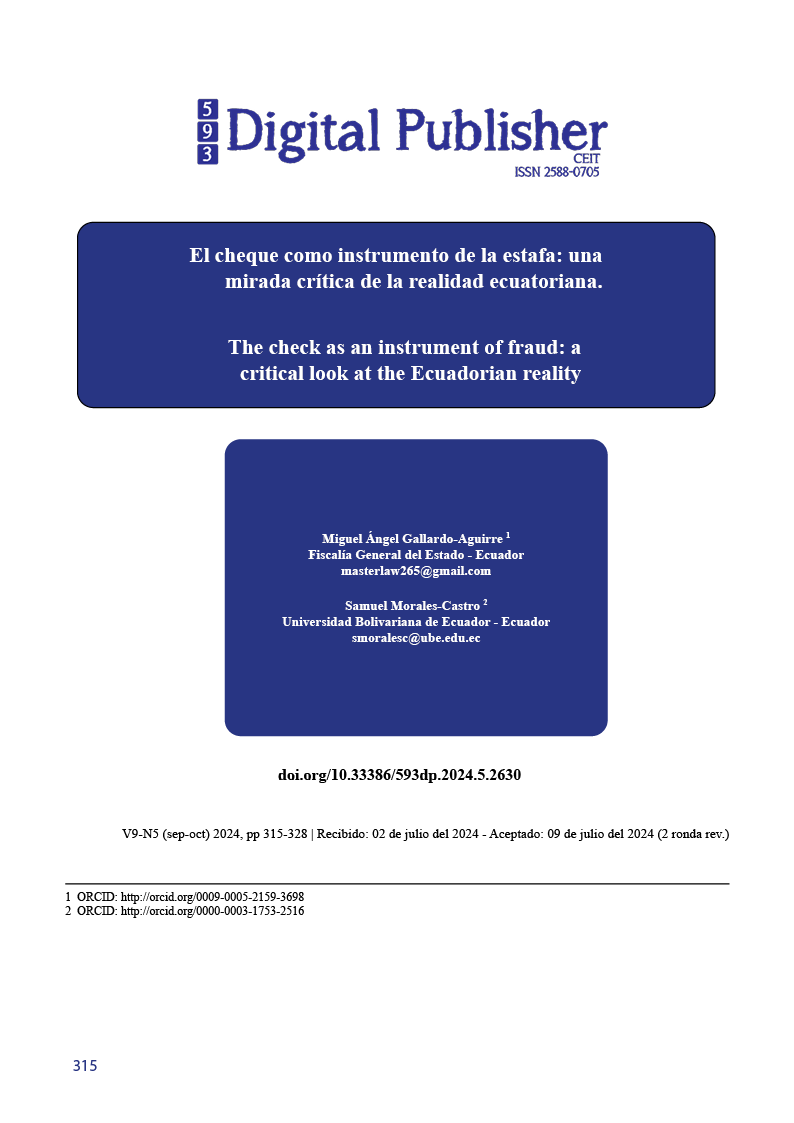The check as an instrument of fraud: a critical look at the Ecuadorian reality
Main Article Content
Abstract
This work focuses on the impact of the constitution of the check, as a fraudulent instrument, for the classification of fraud and its impact on public faith and personal assets. Conditioning that leads to establishing the necessary conditions for the fact, as well as the differences in when its execution must be carried out through civil means and when through criminal means. Determining, where appropriate, that the lack of funds does not imply, per se, the commission of the unjust act, but rather derives from how it was issued; If the check was drawn when the checking account was open, it does not constitute fraud, even if it happens when the beneficiary goes to cash it and there are no funds. Nor is it when the financial institution has not notified the owner of its closure. In this type of case, collection is through civil means in executive or summary proceedings. The existence of complaints of apparent fraud is common, and in the initial libel of this the alleged victim states that she has been “swindled” because the check has been protested for insufficient funds. Consequently, it can be concluded that this is not a criminal action, but rather a civil action, given that there has been no fraud or intention, only an opportunity for collection. For the classification of fraud, a preceding or concurrent deceptive action is required, which is the ratio essendi of the crime, in order to enrich the assets of the perpetrator.
Downloads
Article Details

This work is licensed under a Creative Commons Attribution-NonCommercial-ShareAlike 4.0 International License.
1. Derechos de autor
Las obras que se publican en 593 Digital Publisher CEIT están sujetas a los siguientes términos:
1.1. 593 Digital Publisher CEIT, conserva los derechos patrimoniales (copyright) de las obras publicadas, favorece y permite la reutilización de las mismas bajo la licencia Licencia Creative Commons 4.0 de Reconocimiento-NoComercial-CompartirIgual 4.0, por lo cual se pueden copiar, usar, difundir, transmitir y exponer públicamente, siempre que:
1.1.a. Se cite la autoría y fuente original de su publicación (revista, editorial, URL).
1.1.b. No se usen para fines comerciales u onerosos.
1.1.c. Se mencione la existencia y especificaciones de esta licencia de uso.
References
Beccaria, C. (2009). De los delitos y las penas. Quito - Ecuador: Maxificado.
Castillo Álava, J. (2023). El derecho a la prueba en la Investigación Preparatoria. Lima - Perú : Instituto Pacífico.
Código Orgánico General del Procesos. (2023). Quito - Ecuador: Corporación de Estudios y Publicaciones.
Código Orgánico Integral Penal. (2023). Quito - Ecuador: Corporación de Estudios y Publicaciones.
Código Orgánico Monetario y Financiero. (2023). Quito - Ecuador: Corporación de Estudios y Publicaciones.
Constitución de la República del Ecuador. (2023). Quito - Ecuador: Corporación de Estudios y Publicaciones.
Corte Nacional de Justicia, 0022-GG-2010 (02 de marzo de 2010).
Corte Nacional de Justicia, 05283-2015-01966 (31 de mayo de 2018).
ESPASA. (2001). Diccionario Jurídico. Madrid - España: ESPASA.
Fabra Zamora, J. (2013). Estado del arte de la filosofía de la respomnsabilidad extracontractual. La filosofía de la responsabilidad civil, 21 - 120.
López Ramírez, M. (2019). Aspectos legales y comerciales de la consignación de cheque en canje como medio de estafa en Colombia. Barranquilla - Colombia: Universidad de la Costa.
Macías Alvarado, V. (2008). La utilización dolosa del cheque en la legislación ecuatoriana. Portoviejo - Ecuador: Editorial Jurídica L&L.
Román Márquez, Á. (2020). El delito imprudente. I Congreso Internacional de Teoría del delito, 12 - 27.
Suárez Montes, R. (1986). Concurrencia de cheque en descubierto y estafa. 360 - 380.
Urbano Martínez, J. (2021). ¿Dudar y condenar? Bogotá - Colombia : Universidad Externado de Colombia.
Zambrano Pasquel, A. (2017). La imputación objetiva: Opúsculos penales y constitucionales. Quito - Ecuador: Murillo Editores.



